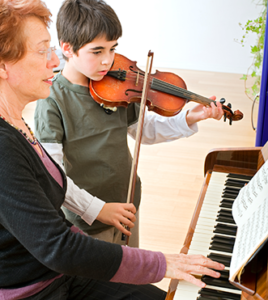
We all have heard the phrase “Practice Makes Perfect.” But how do we help our students or children optimize their practice sessions, especially those leading to a performance, festival or competition? I have gathered 11 pointers below to suggest strategies that are sure to improve a musician’s confidence, memory skills, techniques and stage stamina.
Practice in Front of a Mirror
It can feel uncomfortable to practice in front of a mirror at first. However, observing hand postures, face expressions, shoulder levels, instrument alignment will help shape the appearance of a professional performer. Improving physical positioning of the instrument warrants a more superior sound production.
Perform in Front of Family Members or Friends
Setting up a mini stage in your house and inviting your family to be your audience is a great way to gain confidence. In fact, it is more nerve wracking to perform in front of your loved ones than strangers. The purpose of this exercise is learning to control your nerves associated with stage fright or stage anxiety.
Importance of Memorizing the Music
When the music is memorized, we connect more to the process of expressing the feelings in the music, rather than playing through a piece of music. Besides the benefits of improving our memory skills, performing by memory allows a player to focus on dynamics with more sensitivity, to move freely as the music speaks to you, or close your eyes when you need to focus on a difficult part of the piece.
Find a quiet environment
Practicing in a room or space where there are no distractions is vital. Eliminating unnecessary noise, cell phone rings, people chattering, or children playing around creates a mental chaos that impedes a focused practice session.
Envision your performance
Professional musicians often envision their whole performance in their head. They play their piece from the beginning to the end while imagining the audience, hearing their accompaniment simultaneously and breathing through phrases. This practice is mental and it is effective in gaining confidence later on stage.
Find your most productive time frame
Some people are early risers and others are late owls. It is instinctive that scheduling time to practice during the time of the day when you are most energized is key to a more conducive practice session.
Practice Wisely
Start with the most difficult parts of your piece or chisel a torturous fast passage, rather than playing the song or piece from the beginning to the end. Spend time engaging your mind to focus on the weaker musical segments using creative technical exercises.
Start somewhere else, not the beginning
This happens with younger musicians more often than with those who have had prior performing experience. Starting from the beginning of a piece, every single day, wastes the energy quicker. Thus not using the full brain capacity to fix difficult places later in the piece.
Get Air
It might be counterintuitive to think that exercise and spending time outside relates to playing a musical instrument. However, the release of endorphins produces a state of happiness and a rush of energy in our body. Being happy and energetic is guaranteed to improve your stamina to play for longer periods of time and provide a positive attitude towards tedious practice sessions.
Record Yourself
Most of us feel embarrassed to hear ourselves talking or playing in a video. Nonetheless, this constructive method of hearing ourselves from a side, presents the most honest feedback of how we are performing. Afterall, our perception of judging ourselves is more consequential than a strangers’ critique.
Listen to other performances of your piece
Gathering stylistic, technical and musical inspirations from other performers grants us an avenue to re-create a new way of interpreting a piece of music. It is necessary for each aspiring musician to form their own unique performance skills. Listening and analyzing other performers’ musical details will enrich one’s vision to play with more enthusiasm, historical understanding of the style, and eloquent phrase perception.



